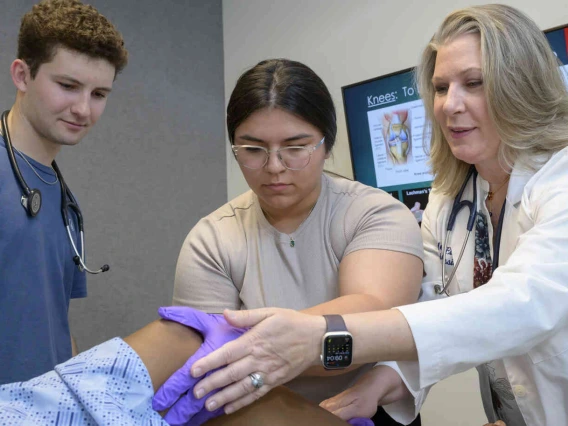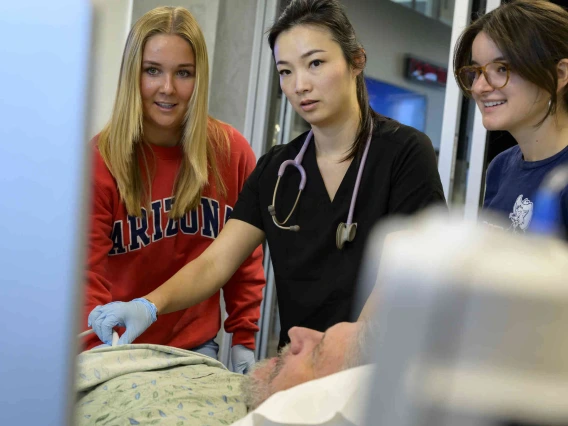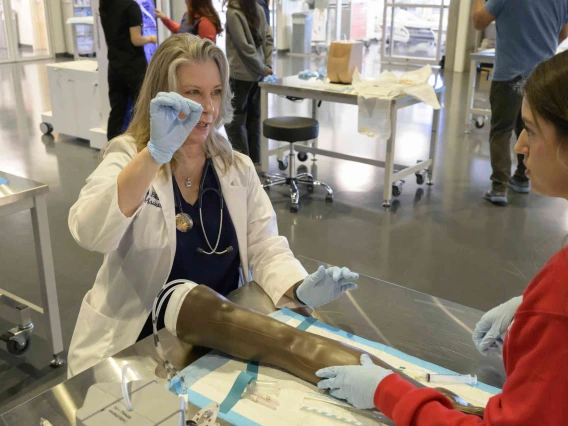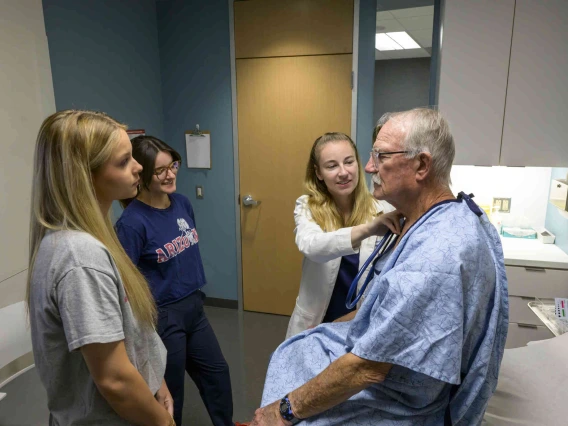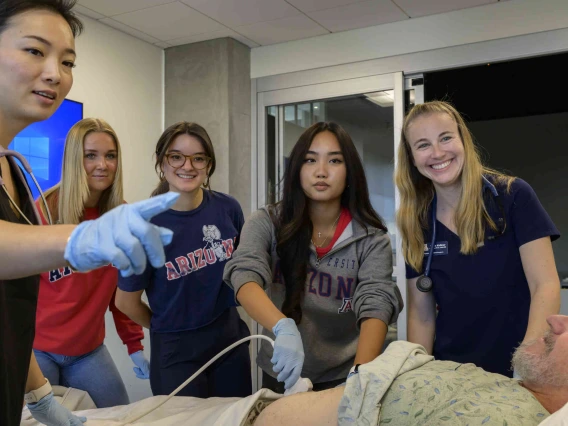Didactic Phase Curriculum Components & Credit Hours
Fall I
PAP601 – Foundations in Medicine I (3 credit hours)
PAP611 – Clinical Medicine I (8 credit hours)
PAP621 – Clinical Skills I (2 credit hours)
PAP622 – Clinical Skills I Lab ( (1 credit hour)
PAP631 – PAs in Health Care (1 credit hour)
PAP641 – PA Clinical Reasoning Workshop I (1 credit hour)
PAP651 – Evidence Based Medicine (1 credit hour)
SPAN661 – Medical Spanish I (2 credit hours)
SPAN662 – Medical Spanish I Workshop (1 credit hour)
Spring 1
PAP602 – Foundations in Medicine II (3 credit hours)
PAP612 – Clinical Medicine II (8 credit hours)
PAP623 – Clinical Skills II (2 credit hours)
PAP624 – Clinical Skills II Lab (1 credit hour)
PAP632 – Ethics & Professionalism for PA (1 credit hour)
PAP642 – PA Clinical Reasoning Workshop II (1 credit hour)
PAP652 – Health, Justice, & Society I (1 credit hour)
SPAN663 – Medical Spanish II (2 credit hours)
SPAN664 – Medical Spanish II Workshop (1 credit hour)
Fall 2
PAP603 – Foundations in Medicine III (3 credit hours).
PAP613 – Clinical Medicine III (8 credit hours)
PAP625 – Clinical Skills III (1 credit hour)
PAP626 – Clinical Skills III Lab (1 credit hour)
PAP633 – Health Systems (1 credit hour)
PAP643 – PA Clinical Reasoning Workshop III (1 credit hour)
PAP653 – Health, Justice, & Society II (1 credit hour)
SPAN665 – Medical Spanish III (2 credit hours)
SPAN667 – Medical Spanish III Workshop (1 credit hour)
Clinical Phase Curriculum Components & Credit Hours
The clinical phase of the University of Arizona Physician Assistant program offers immersive, hands-on training through a variety of core rotations designed to provide students with comprehensive exposure to the health care field. Under the guidance of experienced preceptors, students apply their knowledge while gaining proficiency in diagnosing and managing patient care across the lifespan and in diverse clinical settings.
Each rotation is five weeks in length with the exception of the ten-week Family Medicine rotation. This critical phase of the curriculum fosters the development of clinical skills, professional competency and confidence, ensuring graduates are well prepared to excel in their roles as compassionate and capable health care providers.
Required core rotations:
- PAP687-Behavioral Medicine – 5 Credit Hours
- PAP681-Emergency Medicine – 5 Credit Hours
- PAP682-Family Medicine for PA – 10 Credit Hours
- PAP683-Internal Medicine for PA – 5 Credit Hours
- PAP685-Pediatrics for PA – 5 Credit Hours
- PAP686-Surgery for PA – 5 Credit Hours
- PAP688-Women’s Health for PA – 5 Credit Hours
Students will also explore personal clinical interests through ‘selective’ rotation experiences. Selective rotations are elective specialties that have been preapproved by the PA program to support our mission.
- PAP689-Selective Rotation for PA – 5 Credit Hours
- PAP698-PA Directed Research (Capstone) – 2 Credit Hours
- PAP690-Transition to Practice – 1 Credit Hour
- PAP699-Independent Study – 1 Credit Hour
Securing clinical sites or preceptors is not a requirement of the U of A PA program. The program abides by the Standard A3.03 of the ARC-PA, which states prospective and enrolled students must not be required to provide or solicit clinical sites or preceptors.
Distant Clinical Rotations
The University of Arizona Physician Assistant Program supports the use of distant clinical rotations as an essential component of our mission to develop skilled and compassionate physician assistants dedicated to primary care and rural health.
By participating in rotations beyond the Tucson region, students gain meaningful experience working with diverse and often underserved communities. These experiences enhance clinical competence, cultural awareness, and adaptability across a variety of healthcare settings.
Distant rotations provide opportunities to engage directly with populations that reflect the program’s commitment to equitable and accessible health care for all. They also promote clinical excellence, inclusivity, wellness, and community engagement.
Students completing distant rotations are responsible for any costs associated with housing and transportation during these assignments. The program encourages students to plan accordingly and to view these experiences as valuable investments in their professional development and service to communities in need.


